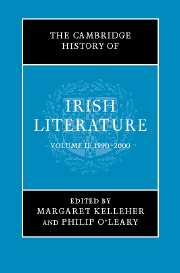Book contents
- Frontmatter
- Introduction
- 1 Literature and politics
- 2 The Irish Renaissance, 1890–1940: poetry in English
- 3 The Irish Renaissance, 1890–1940: prose in English
- 4 The Irish Renaissance, 1890–1940: drama in English
- 5 The Irish Renaissance, 1880–1940: literature in Irish
- 6 Contemporary prose and drama in Irish 1940–2000
- 7 Contemporary poetry in Irish: 1940–2000
- 8 Contemporary poetry in English: 1940–2000
- 9 Contemporary prose in English: 1940–2000
- 10 Contemporary drama in English: 1940–2000
- 11 Cinema and Irish literature
- 12 Literary historiography, 1890–2000
- Afterword: Irish-language literature in the new millennium
- Afterword: Irish literature in English in the new millennium
- Guide to major subject areas
- Index
- References
4 - The Irish Renaissance, 1890–1940: drama in English
Published online by Cambridge University Press: 28 March 2008
- Frontmatter
- Introduction
- 1 Literature and politics
- 2 The Irish Renaissance, 1890–1940: poetry in English
- 3 The Irish Renaissance, 1890–1940: prose in English
- 4 The Irish Renaissance, 1890–1940: drama in English
- 5 The Irish Renaissance, 1880–1940: literature in Irish
- 6 Contemporary prose and drama in Irish 1940–2000
- 7 Contemporary poetry in Irish: 1940–2000
- 8 Contemporary poetry in English: 1940–2000
- 9 Contemporary prose in English: 1940–2000
- 10 Contemporary drama in English: 1940–2000
- 11 Cinema and Irish literature
- 12 Literary historiography, 1890–2000
- Afterword: Irish-language literature in the new millennium
- Afterword: Irish literature in English in the new millennium
- Guide to major subject areas
- Index
- References
Summary
Myths of origin
Histories of the drama of the ‘Irish Renaissance’ usually do not begin in 1890; they begin instead in the summer of 1897. Following signposts in memoirs by W. B. Yeats and Augusta Gregory, scholars often date the conception of modern Irish drama to a conversation between these two held in a land agent’s office on the seaside Galway property of a landlord with the storybook name, Count Florimande de Basterot. As the rain fell outside, 32-year-old Yeats spoke to 45-year-old widowed Lady Gregory of his long-held wish for an Irish theatre in which the plays he and her neighbour Edward Martyn had written could be performed. But what was the use? No professional theatre in Dublin would take them; a sufficient audience could not be found for them; and who would subsidise such unpopular performances? Lady Gregory took the bait, and asked how much was needed. £300 for one week of performances. She thought that such a sum might be raised by a public-spirited appeal to people of wealth and position in Ireland, many of whom she herself knew. To start the fund, she donated £25 of her own money.
- Type
- Chapter
- Information
- The Cambridge History of Irish Literature , pp. 181 - 225Publisher: Cambridge University PressPrint publication year: 2006



